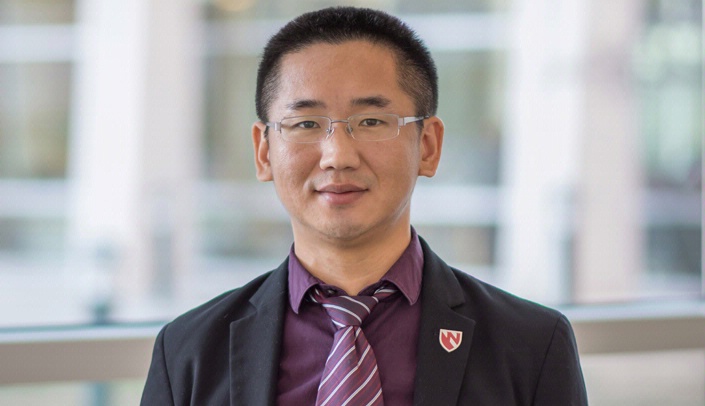Hanjun Wang, M.D., assistant professor of anesthesiology, came to UNMC from China in 2007, at the bequest of his mentor, Wei Wang, M.D., Ph.D.
The importance of mentorship
Hanjung Wang, M.D., said he never really had a plan for his career path. “All of my career has been an accident,” the Joseph P. and Harriet K. Gilmore Distinguished New Investigator Award winner said.
But it hasn’t been an accident to his mentors, Wei Wang, M.D., Ph.D., and Irving Zucker, Ph.D.
Dr. Wang said when he speaks to young scientists, he emphasizes the importance of hard work, yes. But just as important is finding the right mentor.
Drs. Wei Wang and Zucker helped put Dr. Wang onto the track through which that hard work would eventually pay off.
Dr. Wei Wang asked him to investigate a novel field of study. Though it was laborious, and took a long time to bear fruit, it proved to be the right move.
Later, Dr. Zucker helped Dr. Wang shape his career, step by step.
Young scientists “have no idea on their career, where it is going — but he knows,” Dr. Wang said of a good mentor, like Dr. Zucker.
Now that he is a mentor himself, he hopes to set a similar example for those whom he trains. He wants them to succeed. Their success is his success. It is UNMC’s success.
Hopefully, it’s the world’s success.
Dr. Hanjung Wang held a faculty post in China, and had he a different personality, he might have returned to his home country to pursue a different career track.
“I was a quieter man,” Dr. Wang said.
Instead, at UNMC, he found the kind of environment and collaborative and mentorship support that allowed him to fully focus on science.
Working under Dr. Wei Wang, and later, Irving Zucker, Ph.D., professor and chair of the UNMC Department of Cellular and Integrative Physiology, Dr. Wang flourished.
“Now,” he said, “I know my career, my goal, my mission.”
Earlier this year he was named a UNMC New Investigator. And now, he is the 2017 winner of the Joseph P. and Harriet K. Gilmore Distinguished New Investigator Award.
Dr. Wang has taken on the study of sensory-nerve afferents — the signals sent toward the central nervous system — and their role in cardiovascular function, including in disease states.
In other words, during chronic heart failure, these sensory nerves send out a distress signal. The brain then answers with an emergency response, thus making the already-injured heart work even harder.
Dr. Wang theorized that blocking the afferent sensory nerve endings, through drug treatment, would let the heart rest, instead — a “hibernation strategy,” that would allow the patient to live longer while waiting for a transplant.
Dr. Wang is “carving out a significant national reputation in the area of neural control of cardiovascular function,” Dr. Zucker said, in nominating his mentee for the Gilmore Award.
His work won two RO1 grants in a year, among other impressive funding awards.
Though it has not been an easy road — he spent a year and a half on the project that would result in his first paper — he credits UNMC’s environment for his success.
George Rozanski, Ph.D., played a key role at a key time, Dr. Wang said. And more than any award, Dr. Wang appreciates having found a home in the department of anesthesiology. There, he and clinicians work together to “finish the mission.”
“Hanjun is a tremendous person and a spectacular scientist with a very promising future,” said anesthesiology chair Steven Lisco, M.D.
Dr. Wang said: “I have found the goal for my career – to use sensory therapy to benefit patients.”

Congratulations Hanjun!